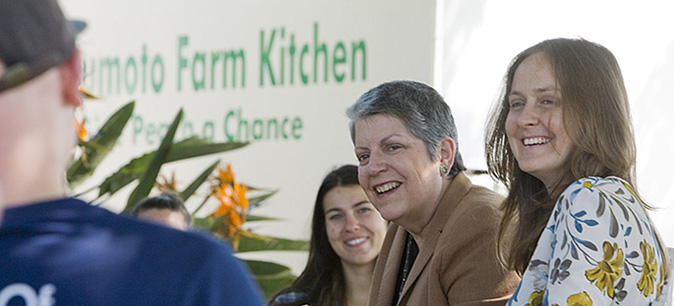UC students awarded Global Food Initiative fellowships

UC President Janet Napolitano listens to the first class of UC Global Food Initiative student fellows discuss their projects at Matsumoto Family Farm in Del Rey.
The University of California has selected its second class of Global Food Initiative fellows, students from around the UC system who will work on projects ranging from food access to policy to waste.
The 44 fellows, representing all 10 UC campuses plus UC Agriculture and Natural Resources (ANR) and Lawrence Berkeley National Laboratory, will help advance the systemwide initiative, which aims to put UC, the state and the world on a pathway to sustainably and nutritiously feed themselves.
The $4,000 fellowships to undergraduate and graduate students, selected by the campuses, will fund student-generated research, projects or internships that support the initiative’s efforts to address food security, health and sustainability. Examples include projects to increase food recovery, advance food literacy, expand experiential learning opportunities in food systems and reduce greenhouse gas emissions through local sourcing of food.
Based on feedback from last year’s fellows, one fellow from each campus this year will receive an additional $500 as student ambassador to help build campus engagement for the initiative.
Ryan Dowdy, a second-time fellow from UC Davis who is working on a project to convert food waste into electricity to aid in the desalination process of sea water, said he is excited to interact with the new crop of fellows.
“Our research has the ability to transform policy for a more sustainable food system,” Dowdy said. “I am honored to represent UC Davis as we join the entire UC community in working on the future of food in California.”
UC leaders launched the Global Food Initiative last year.
In April, the first class of GFI fellows toured an organic peach farm near Fresno. In July, they teamed with UC’s Carbon Neutrality Initiative fellows at a symposium to learn, network, build leadership skills and share information about their projects. A survey of the first class of GFI fellows found that 76 percent agreed the fellowship influenced their career plans and 96 percent agreed the fellowship exposed them to new ideas and concepts.
Planned activities for the new fellows include an orientation, leadership training, spring field trip and joint summer symposium with Carbon Neutrality Initiative fellows. The bulk of the fellowship funding comes from the UC President’s Initiative Fund, with several campuses augmenting the funding to support additional student fellowships.
“The UC Global Food Initiative fellows play a critical role in helping to advance the initiative through research, service and engagement,” said Wendy Slusser, associate vice provost for the UCLA Healthy Campus Initiative and co-leader of multiple GFI working groups. “I was very impressed with the first class of fellows and am looking forward to supporting the new fellows as we work to improve the health of our students, faculty, staff and the broader community.”
Here is a list of the second class of GFI student fellows and their projects:
UC Berkeley
- Emily Altman, food access and security
- Tara Benesch, leveraging research for policy in food systems
- Nicole Wong, experiential learning and student engagement
UC Davis
- Nick Doherty, Aggie Health app
- Ryan Dowdy, powering sea water desalination with microbial fuel cells from food waste
- Aria Wexler, food advocacy and nutrition education for students
UC Irvine
- Clare Gordon, Dhruti Khetani and Laura Rood, food engagement and communications
- Emanuel Preciado, UC Irvine garden project
UCLA
- Yashasavi Datta, interactions between human rights and food security
- Jesse Flores, community development through food and public health
- Savannah Gardner and Tyler Watson, food recovery
- Cailey Hall, literary and cultural history of food
- Margaret LaGaly, impacts of food and agriculture on society
- Phuong Kim Le, perception and consumption of food across cultures
- Hannah Malan, food literacy
UC Merced
- Isabella Beltran, campus community garden and solar irrigation system
- Hoaithi Dang, increasing student awareness and participation in the GFI
- Andrew Zumkehr, reduction of greenhouse gas emissions through local sourcing of food
UC Riverside
- Holly Mayton, improving food safety and sustainability
- Melina Reyes, food security through R’Pantry (UC Riverside’s food pantry for students)
- Claudia Villegas, Seeds and Trees parent-child program
UC San Diego
- Gabriela Estrada, food composting
- Jessica Pompa, food waste recovery
- Renu Singh, food waste reduction
UC San Francisco
- J. Daniel Kelly, cross-sectional study of food insecurity, poor nutrition, and other risk factors of symptomatic and asymptomatic Ebola-infected persons in hotspots of the 2014-15 Ebola epidemic of Sierra Leone
- Mike Reid, diabetes, diet and microbial translocation
- Matthew Spinelli, impact of food insecurity on HIV treatment
UC Santa Barbara
- Jessica Alvarez, campus sustainability plan
- Genesis Gilroy, campus food policy
- Maile Hartsook and Nancy Yang, edible campus project
UC Santa Cruz
- Hamutahl Cohen, food access and experiential learning in food systems
- Katherine Ennis, impact of land use and climate on insects and ecosystems
- David Robles, publicity and community outreach
- Judy Xie, food equity and access
UC ANR
- Erika Brown, UC Berkeley, student food security research project
- Jian “Jay” Gelvezon, UC Davis, UC ANR media relations and community outreach
- Matthew Shapero, UC Berkeley, UC Cooperative Extension seminars and workshops
Berkeley Lab
- Kripa Akila Jagannathan, UC Berkeley, evaluating skills of global climate models in predicting local climatic metrics
- Sarick Matzen, UC Berkeley, investigating arsenic bioavailability in the context of urban agriculture
- Linsey Shariq, UC Davis, uptake and health risk assessment of hydraulic fracturing chemicals in wheat


